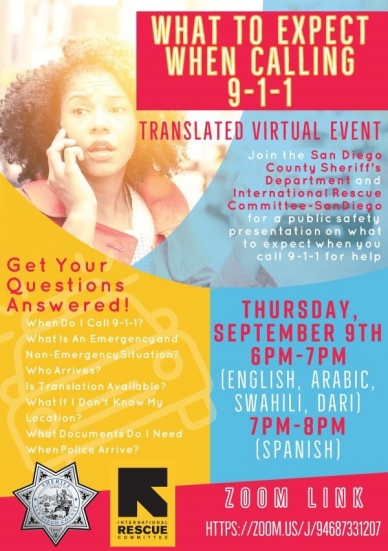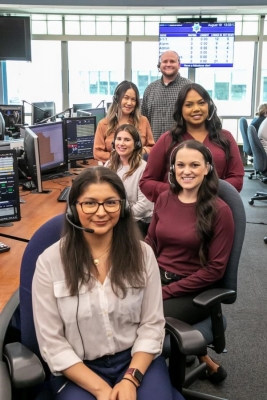 Source: San Diego Sheriff
Source: San Diego Sheriff
September 8, 2021 (San Diego) – “We want our immigrant and refugee neighbors to know the San Diego County Sheriff's Department embraces people of all backgrounds, faiths, cultures and nationalities. We welcome you to the county. You are a valuable part of our communities,” a press release from the San Diego Sheriff states. “We understand it can be challenging to adapt to a new environment and navigate public safety services.”
To help, the Sheriff's Department is partnering with the San Diego Chapter of the International Rescue Committee (IRC) for a practical guide on using 9-1-1. The public webinar on Calling 9-1-1 is free. There is no need to register. Choose the time and language that's convenient for you and click on the meeting link provided below:
Thursday, September 9
6:00 p.m. to 7:00 p.m. – English, Arabic, Dari and Swahili
7:00 p.m. to 8:00 p.m. – Spanish
Virtual Meeting Link: https://zoom.us/j/94687331207
These topics will be covered, along with answering questions you may have:
- What is 9-1-1?
- When should you use 9-1-1?
- What is an emergency?
- How do I make a 9-1-1 call?
- What if I don't speak English?
- What if I am deaf, hard of hearing or have difficulty speaking?
- What will be asked if I call 9-1-1?
- Do I have to give my name and contact number?
- How do I tell the dispatcher the location of my emergency?
- Why is my call being transferred to another agency?
- Teaching children how to call 9-1-1.
- Pocket dials, calling 9-1-1 by mistake, prank calls, non-emergency calls.
- Reporting crime instead of posting on social media.
- Staying calm and answering questions.
 “The Sheriff's Department honors the rich diversity of the communities we serve. We want everyone to feel safe in their home, at school or job, places of worship and their neighborhoods. We also recognize mutual trust and respect is the cornerstone of public safety,” the Sheriff’s press release adds. “We want our refugee and immigrant neighbors to rebuild their lives with ease and have an understanding of the services we provide. We want them to feel safe in calling for help and reporting crime to us.”
“The Sheriff's Department honors the rich diversity of the communities we serve. We want everyone to feel safe in their home, at school or job, places of worship and their neighborhoods. We also recognize mutual trust and respect is the cornerstone of public safety,” the Sheriff’s press release adds. “We want our refugee and immigrant neighbors to rebuild their lives with ease and have an understanding of the services we provide. We want them to feel safe in calling for help and reporting crime to us.”
Sheriff's Deputies do not enforce immigration law and they will never ask about your immigration status.
Since 2019, the Sheriff's Department has collaborated with the International Rescue Committee – San Diego to welcome those seeking a haven, a new home and opportunities in the county. Newcomers face challenges in learning a new language, understanding different cultures and finding ways to support themselves. The Sheriff's Community Inclusion Director and deputies provide classes to educate refugees about American laws, the legal system, domestic violence, child abuse, 9-1-1 and what to do during a traffic stop. Feedback from monthly classes shaped the public webinar on Calling 9-1-1.
When we advance the well-being of refugee and immigrant communities, our entire county thrives. Community members are more likely to report crime and talk to deputies about what's happening in their neighborhoods which helps in solving and preventing crimes.
 Sheriff's Emergency Services Dispatchers are the lifeline between people in dangerous situations and the help they need. They handle nearly 2,000 emergency and non-emergency calls per day. The goal is to answer calls in 15 seconds or less. The Sheriff's Communications Center is in Kearny Mesa and is staffed 24 hours per day to serve the public. Translation services and Text to 9-1-1 in English are offered to anyone needing assistance.
Sheriff's Emergency Services Dispatchers are the lifeline between people in dangerous situations and the help they need. They handle nearly 2,000 emergency and non-emergency calls per day. The goal is to answer calls in 15 seconds or less. The Sheriff's Communications Center is in Kearny Mesa and is staffed 24 hours per day to serve the public. Translation services and Text to 9-1-1 in English are offered to anyone needing assistance.











Recent comments